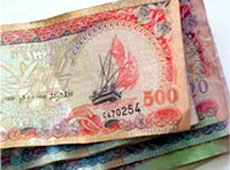The Maldives Airports Company Limited (MACL) and its lawyers have denied any intention of dissipating the state-owned company’s assets by transferring them to a newly-created, state-owned entity called Male’ International Airport Limited (MIAL).
MACL and the government of the Maldives are currently party to arbitration proceedings in Singapore after one of the lenders to the terminated GMR-Malaysia Airports (GMR-MAHB) development – Mumbai-based Axis Bank – called in US$160 million worth of loans which had been guaranteed by the Ministry of Finance.
A copy of the agreement from November 24, 2010, in which the Ministry of Finance guarantees the loans to GMR-MAHB, is signed and stamped by both then-MACL Chairman Ibrahim Saleem and Finance Minister Ali Hashim on behalf of the government.

Eviction and arbitration
In December 2012, the GMR-MAHB consortium, which had signed a 25 year concession agreement with the former government to manage and upgrade Male’s airport, was given a seven day eviction notice by the new government after it declared the concession agreement void ab initio, or ‘invalid from the outset’.
That decision is currently subject to arbitration proceedings in Singapore, with GMR-MAHB’s compensation claim expected to reach upward of US$1 billion. Axis Bank is pursuing the US$160 million in separate proceedings.
President Waheed’s government on March 14 meanwhile declared in a one-line statement that it was establishing MIAL as a new 100 percent state-owned company, and several weeks later announced the appointment of a board of directors including tourism tycoon and Chairman of Universal Enterprises, Mohamed Umar Manik, and Island Aviation Chairman Bandhu Ibrahim Saleem as managing director.
Finance Minister Abdulla Jihad informed local media on May 21 that MIAL would take over the operation of the airport under a management contract by July.
The apparent move to transfer MACL’s management functions to MACL led to a flurry of letters from Axis Bank to both MACL and the government, with the bank expressing concern that “if MACL ceases to manage and operate Male’ airport, and MIAL instead performs that role, then MACL will lose almost all of MACL’s revenue stream, and become a shell.”
MACL’s denial
In a letter responding to Axis Bank’s CEO Bimal Bhattacharyya, dated April 24, 2013, and obtained by Minivan News, MACL’s Managing Director Ibrahim Mahfooz claims “your insinuation that MACL is attempting to dissipate assets to avoid and satisfaction of any judgement is insulting and without any basis.”
“For the record, we can confirm that MACL has no plans to transfer any of its assets to another company,” Mahfooz writes.
He accuses Axis Bank of making a case on “hearsay and speculation”, and asks whether its threat of legal action was “part of a concerted plan with any other parties”.
“You have tried to assert that your claim of US$163,596,347.78 remains unsatisfied. We had in our previous correspondence to you made it clear that you do not have a valid claim against MACL,” Mahfooz states.
“At best your alleged claim (at its highest) is purely a monetary claim against MACL and GOM. Please set out clearly the basis in which you think your claim will not be satisfied by MACL and GOM in the event Axis Bank is not successful,” he writes.
That letter triggered a further flurry of correspondence between Axis Bank’s legal representation Norton Rose and MACL’s Singapore-based firm Advocatus.
The latter firm, acting on behalf on MACL in December 2012, successfully overturned an injunction in the Singapore Supreme Court blocking MACL from taking over the airport, on the grounds that the arbitration court had no jurisdiction to prevent the Maldives as a sovereign state from expropriating the airport.
In the Singapore Supreme Court’s full verdict, a copy of which Minivan News has obtained, Financial Controller for the Ministry of Finance, Mohamed Ahmed, “affirmed in an affidavit that the Maldives government would honour any valid and legitimate claim against it. He also stressed that the Maldives government had never defaulted on any of its payments.”
Lawyer representing MACL, Christopher Anand Daniel, “also accepted that if the arbitration tribunal found that the Appellants were wrong in their asserted case that the Concession Agreement was void ab initio and/or had been frustrated, but the Appellants had by then already gone ahead with the taking over of the airport, they would at least be liable to compensate the respondent for having expropriated the airport” (emphasis retained).
Legal barrage
Stern letters exchanged throughout late April and most of May between the two sets of lawyers suggest brewing disagreement over whether MIAL’s assumption of management responsibilities for the airport can be construed as a transfer of assets and an attempt to dissipate its assets in preparation for a costly verdict.
“Almost all of MACL’s income comes from MACL’s management and/or operation of Male’ Airport,” notes Axis Bank.
“The stated purpose for the incorporation of MIAL is for MIAL to manage and operate Male Airport. This is a role presently performed by MACL. The natural consequence of the above facts is that if MACL ceases to manage and operate Male’ Airport and MIAL instead performs that role, then MACL will lose almost all of MACL’s revenue stream, and become a shell company,” Axis Bank’s lawyers noted, adding that the government had made no effort to deny this despite repeated invitations.
In response Advocatus, in a letter dated May 10 and obtained by Minivan News, declared “Your client [Axis Bank] has no evidence that MACL is dissipating assets to begin with. It is obvious that your client is attempting to see if it can create a case by correspondence when it has none.”
Following Finance Minister Abdulla Jihad’s pledge that the transfer of assets to MIAL would be completed by July 1, widely reported in local media, Norton Rose wrote another letter noting “[the Minister’s] statements are in direct contradiction to MACL’s position in its letter of April 24 stating that ‘For the record, we can confirm that MACL has no plans to transfer any of its assets to another company.’”
“These new developments, stated in the various news reports, lend credence to Axis Bank’s legitimate concerns that MACL is in fact attempting to dissipate its assets in favour of MIAL or any other third party and, consequently, there will not be sufficient assets to satisfy any arbitral award that may be rendered in favour of Axis Bank against MACL in the arbitration,” the lawyers wrote.
Advocatus responded on May 29, again accusing Axis Bank off “desperately trying to create a case where none exists.”
“The Minister, who had given the interview in Dhivehi, had been misquoted in the English version of news reports you mentioned,” MACL’s lawyers stated.
“When he gave the interview, the Minister had in fact said that ‘asset management is going to be officially handed over to MIAL’,” Advocatus contended.
Assets, management and the draft agreement
Meanwhile, a working draft of an ‘Operations and Management’ agreement between MACL and MIAL, dated May 21 and obtained by Minivan News, notes that MIAL “is a company established with the primary objectives of operating, maintaining and managing the airport.”
The agreement states that while the Finance Ministry has granted MACL the lease of the site and rights to operate and manage the airport, “MACL, in the interest of the better management of the airport, and/or overall public interest, is desirous of granting to MIAL the functions of operating, maintaining and managing the airport.”
The agreement includes provision for the transfer of employees from MACL to the new company, and the requirement that it obtain an aerodrome certificate from the Ministry of Civil Aviation – the core authority issued by the state for a company to operate an airport.
It also noted that “no proceedings against MIAL are pending or threatened, and no fact or circumstance exists which may give rise to such proceedings that would adversely affect the performance of its obligations under this agreement.”
MIAL would be paid management fees by MACL, although the extent of these are not included in the particular draft obtained by Minivan News. The agreement does however set out how “MIAL shall, on behalf of MACL, deposit all monies received from the operation of the airport into one or more bank accounts in the name of MACL.”
Board issues
Despite the Finance Minister’s comments on May 21, MIAL’s appointed CEO Bandhu Saleem has told Minivan News that “until the arbitration is complete, I think it will be very difficult to start a new company.”
Minivan News is seeking to establish the current status of the new company. However further obstacles appeared this week in the form of the government’s Attorney General Aishath Bisham, who informed local media that President Waheed lacked the authority to appoint the boards of government-owned companies following the ratification of January’s Privatisation Act.
Instead, she said, the privatisation board created under that act operated as “a separate legal entity, and has the sole authority to appoint board members.”
Besides MIAL, President Waheed also in February appointed the board of the Maldives Ports Authority Limited (MPL).
“The Privatisation Board should investigate those cases,” suggested the attorney general.
Former President Maumoon Abdul Gayoom, whose Progressive Party of the Maldives (PPM) was among the most strident opponents to GMR-MAHB’s development of the airport, meanwhile appeared to have adopted a conciliatory tone during a visit to India last week to smooth troubled relations.
“[The cancellation] was a very populist move at the time as the public had a perception that the contract was bad for the country. The way it was handled was not good,” Gayoom was reported as telling Indian newspaper The Hindu.
“I am sad that this has somehow affected our bilateral relations. We want to overcome that and restore our relationship with India to its former level,” Gayoom told the paper.
Likes (0)Dislikes
(0)Dislikes (0)
(0)  In September 2012, President Waheed told
In September 2012, President Waheed told  electricity and phone bills if funds were not transferred from the MVR 1.8 billion (US$117 million) Public Sector Investment Programme (PSIP).
electricity and phone bills if funds were not transferred from the MVR 1.8 billion (US$117 million) Public Sector Investment Programme (PSIP).